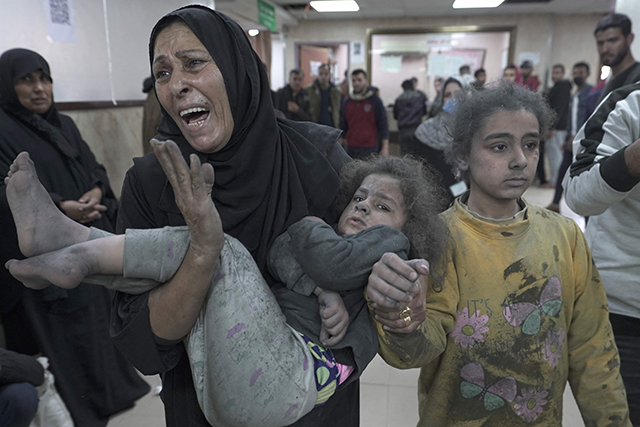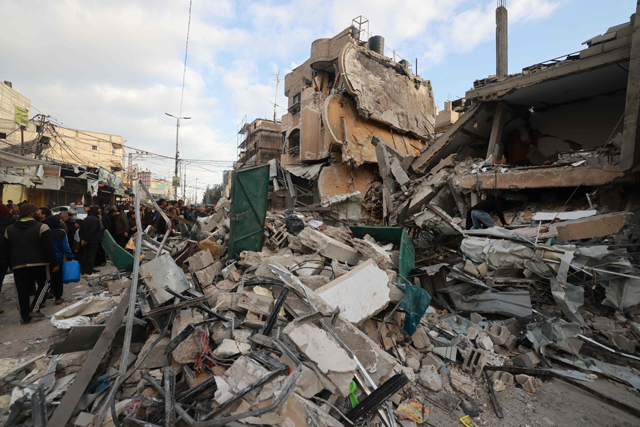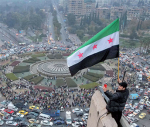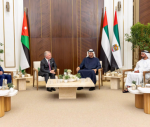You are here
UN experts say Gaza children dying in Israel's 'starvation campaign'
Jul 10,2024 - Last updated at Jul 10,2024
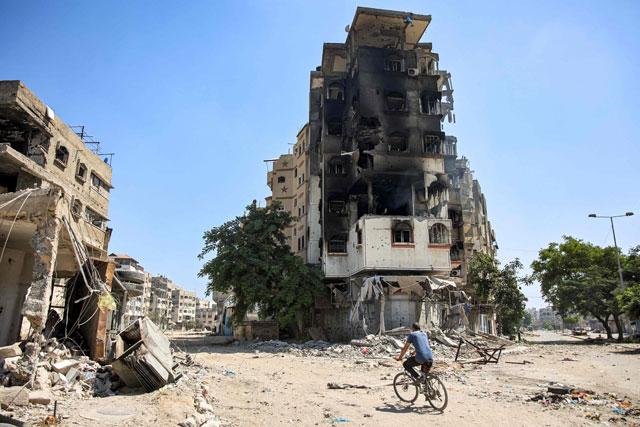
A man cycles past a burnt building in the Tuffah district east of Gaza City on Monday amid the ongoing Israeli war against the costal enclave (AFP photo)
GENEVA — UN rights experts on Tuesday accused Israel of carrying out a "targeted starvation campaign" that has resulted in the deaths of children in Gaza.
"Israel's intentional and targeted starvation campaign against the Palestinian people is a form of genocidal violence and has resulted in famine across all of Gaza," 10 independent United Nations experts said in a statement.
The UN has not officially declared a famine in the Gaza Strip.
But the experts, including the UN special rapporteur on the right to food Michael Fakhri, insisted there was no denying famine was under way.
"Thirty-four Palestinians have died from malnutrition since 7 October, the majority being children," said the experts, who are appointed by the UN Human Rights Council, but who do not speak on behalf of the United Nations.
Israel's mission to the UN in Geneva slammed the statement, charging that "Mr. Fakhri, and many so-called 'experts' who joined [him], are as much accustomed to spreading misinformation, as they are to supporting Hamas propaganda and shielding the terrorist organisation from scrutiny".
The UN experts meanwhile listed three children who had recently died “from malnutrition”, after a number of others were said to have starved to death in northern Gaza earlier this year.
Six-month-old Fayez Ataya and 13-year-old Abdulqader Al-Serhi had died on May 30 and June 1 at Gaza’s Al Aqsa hospital, while nine-year-old Ahmad Abu Reida died on June 3 in the tent sheltering his displaced family in Khan Yunis, they said.
“With the death of these children from starvation despite medical treatment in central Gaza, there is no doubt that famine has spread from northern Gaza into central and southern Gaza,” they said.
The experts decried that the world had not done more to avert this disaster.
“When a two-month-old baby and 10-year-old Yazan Al Kafarneh died of hunger on 24 February and 4 March respectively, this confirmed that famine had struck northern Gaza,” they said.
“The whole world should have intervened earlier to stop Israel’s genocidal starvation campaign and prevented these deaths.”
Gaza has been facing a deep humanitarian crisis since the war erupted following Hamas October 7 attack on southern Israel that resulted in the deaths of 1,195 people, mostly civilians, according to an AFP tally based on Israeli figures.
In response, Israel has carried out a military offensive that has killed at least 38,243 people in Gaza, also mostly civilians, according to the health ministry in the Hamas-ruled territory.
‘Starvation warfare’
The World Health Organisation said on Tuesday that 60 cases of severe acute malnutrition, also known as severe wasting — the most deadly form of malnutrition — had been detected last week at the Kamal Adwan paediatric hospital in the north of the Strip.
The UN has long been warning of looming famine, especially in the north, but one has not been officially declared.
The Israeli mission highlighted Tuesday that the latest assessment by the Integrated Food Security Phase Classification (IPC) partnership determined that famine had not materialised after aid access improved somewhat.
“Israel has continuously scaled up its coordination and assistance in the delivery of humanitarian aid across the Gaza Strip,” it said, claiming Hamas “intentionally steal and hide aid from civilians”.
Hamas authorities meanwhile issued a statement Tuesday describing a “humanitarian catastrophe and escalating famine”.
They accused “the terrorist Israeli government” of continuing “its policy of starvation”, and “preventing the entry of food aid trucks for the 64th consecutive day”.
“Continued starvation warfare threatens a humanitarian disaster and further loss of innocent children,” that statement warned.
Meanwhile, Israeli forces in war-ravaged Gaza City pushed on with a major offensive on Tuesday that has again displaced Palestinians.
Troops, tanks and fighter jets swooped on Gaza’s biggest urban area on the eve of new contacts in Qatar aiming for an eventual hostage-prisoner exchange and a truce in the war raging into its 10th month.
CIA Director William Burns and Israel’s Mossad chief David Barnea are due to travel to Qatar on Wednesday, after Burns held talks with Egypt’s President Abdel Fattah Al Sisi in Cairo.
Hamas, whose October 7 attack triggered the war, has accused Israeli prime minister Benjamin Netanyahu of deliberately escalating fighting in Gaza City and Rafah, in the territory’s south, to thwart an agreement.
The Islamist group’s Qatar-based political chief Ismail Haniyeh said he had made “urgent contact” with mediators, warning that the “catastrophic consequences” of the latest battles could “reset the negotiation process to square one”.
Hamas’ armed wing, the Ezzedine Al Qassam Brigades, described the fighting in Gaza City in recent days as “the most intense in months”.
Fighters were fighting with rockets, mortars and explosives, it said.
After almost two weeks of battles in Gaza City’s eastern Shujaiya district, Israeli forces have extended the fighting into the city’s east, west and south.
Residents reported helicopter strikes, “explosions and numerous gun battles” in the city’s southwest.
Aircraft struck the city as troops were engaged in “close-quarters combat”, seizing weapons and destroying tunnels, the military said, reporting “dozens” of militants killed.
As the Gaza war has raged on, Israel has also exchanged regular cross-border fire with Lebanon’s Hizbollah, allies of Hamas, heightening fears of an all-out war.
Hizbollah on Tuesday released a video showing aerial surveillance footage it said was taken over intelligence and military positions in the Israeli-annexed Syrian Golan Heights.
The release came after an Israeli strike killed a senior Hizbollah commander last week. The group’s chief Hassan Nasrallah was expected to make a televised address Wednesday at an event commemorating the slain fighter.
Israeli foreign minister Israel Katz told Nasrallah on social media to “stop the threats and violence”, and “withdraw” Hezbollah forces from the border area, in line with a 2006 UN Security Council resolution that ended their latest major war.
The Lebanese government has supported the implementation of Resolution 1701, which called for armed personnel to pull back north of the Litani River, some 30 kilometres from the border with Israel.
If a full-blown conflict breaks out, Israel’s top diplomat said Nasrallah “will be considered the destroyer of Lebanon”.
Related Articles
GAZA STRIP, Palestinian Territories — An international effort gathered pace on Friday to get desperately needed humanitarian relief into Gaz
GENEVA — An aid mission to two hospitals in northern Gaza found horrifying scenes of children dying of starvation, amid dire shortages of fo
ROME — Famine is looming in the northern Gaza Strip amid increased hostilities and a near-halt in food aid, a UN-backed assessment said Satu


